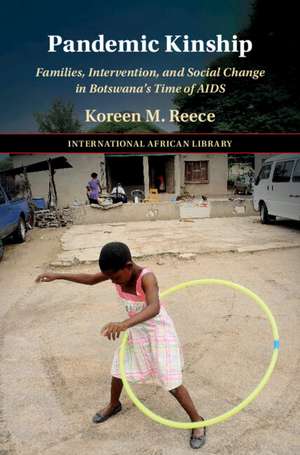Pandemic Kinship: Families, Intervention, and Social Change in Botswana's Time of AIDS: The International African Library, cartea 67
Autor Koreen M. Reeceen Limba Engleză Hardback – 29 iun 2022
| Toate formatele și edițiile | Preț | Express |
|---|---|---|
| Paperback (1) | 270.92 lei 6-8 săpt. | |
| Cambridge University Press – 19 sep 2024 | 270.92 lei 6-8 săpt. | |
| Hardback (1) | 585.59 lei 6-8 săpt. | |
| Cambridge University Press – 29 iun 2022 | 585.59 lei 6-8 săpt. |
Din seria The International African Library
-
 Preț: 230.10 lei
Preț: 230.10 lei -
 Preț: 230.79 lei
Preț: 230.79 lei -
 Preț: 229.90 lei
Preț: 229.90 lei - 9%
 Preț: 592.46 lei
Preț: 592.46 lei -
 Preț: 282.48 lei
Preț: 282.48 lei -
 Preț: 264.64 lei
Preț: 264.64 lei -
 Preț: 202.36 lei
Preț: 202.36 lei - 11%
 Preț: 583.36 lei
Preț: 583.36 lei - 14%
 Preț: 891.04 lei
Preț: 891.04 lei - 11%
 Preț: 636.34 lei
Preț: 636.34 lei -
 Preț: 226.17 lei
Preț: 226.17 lei -
 Preț: 285.37 lei
Preț: 285.37 lei -
 Preț: 323.27 lei
Preț: 323.27 lei -
 Preț: 289.01 lei
Preț: 289.01 lei -
 Preț: 326.15 lei
Preț: 326.15 lei -
 Preț: 287.66 lei
Preț: 287.66 lei -
 Preț: 288.25 lei
Preț: 288.25 lei -
 Preț: 285.54 lei
Preț: 285.54 lei -
 Preț: 285.54 lei
Preț: 285.54 lei -
 Preț: 306.47 lei
Preț: 306.47 lei -
 Preț: 285.75 lei
Preț: 285.75 lei -
 Preț: 284.17 lei
Preț: 284.17 lei -
 Preț: 285.37 lei
Preț: 285.37 lei -
 Preț: 283.03 lei
Preț: 283.03 lei -
 Preț: 279.76 lei
Preț: 279.76 lei -
 Preț: 281.30 lei
Preț: 281.30 lei -
 Preț: 282.48 lei
Preț: 282.48 lei -
 Preț: 213.63 lei
Preț: 213.63 lei
Preț: 585.59 lei
Preț vechi: 657.96 lei
-11% Nou
Puncte Express: 878
Preț estimativ în valută:
112.09€ • 121.79$ • 94.21£
112.09€ • 121.79$ • 94.21£
Carte tipărită la comandă
Livrare economică 21 aprilie-05 mai
Preluare comenzi: 021 569.72.76
Specificații
ISBN-13: 9781009150224
ISBN-10: 1009150227
Pagini: 292
Dimensiuni: 158 x 236 x 22 mm
Greutate: 0.6 kg
Ediția:Nouă
Editura: Cambridge University Press
Colecția Cambridge University Press
Seria The International African Library
Locul publicării:Cambridge, United Kingdom
ISBN-10: 1009150227
Pagini: 292
Dimensiuni: 158 x 236 x 22 mm
Greutate: 0.6 kg
Ediția:Nouă
Editura: Cambridge University Press
Colecția Cambridge University Press
Seria The International African Library
Locul publicării:Cambridge, United Kingdom
Cuprins
Introduction; Part I. 'Where are you from? Where are you going?': The Geographies of Kinship: 1. Going up and down; 2. 'Ke a Aga': lorato, building; 3. Geographies of intervention; Part II. 'Who is taking care of your things?': Care, Conflict, and the Economies of Kinship: 4. Children of one womb; 5. Taking what belongs to you; 6. Supplementary care; Part III. 'We are seeing things': Recognition, Risk, and reproducing Kinship: 7. Recognising pregnancy; 8. Recognising marriage; 9. Managing recognition in a time of AIDS; Part IV. 'They were far family': Child circulation and the limits of Kinship: 10. Far family; 11. Living outside; 12. Children in need of care; Part V. 'We show people we are together': Making selves, Families, Villages, and Nations: 13. The village in the home: A party; 14. 'Lifting up culture': A homecoming; 15. A global family.
Recenzii
'Drawing on years of intimate involvement with a family in southeastern Botswana, Koreen Reece provides a compelling portrait of how well-intended humanitarian interventions fail to engage with local imperatives to work out conflicts among kin. This is a signal contribution to the literature on kinship and humanitarianism in southern Africa.' Frederick Klaits, University at Buffalo
'This is a beautifully written, intimate portrait of family life in the time of pandemics. With a perspective that draws on years of both ethnographic and NGO work, Koreen Reece provides an innovative analysis of Tswana kinship that demonstrates how its oft-cited ambiguity productively drives life forward.' Jacqueline Solway, Trent University
'In Pandemic Kinship, Reece places crisis and conflict at the center of our understanding of processes that create kinship, thereby brilliantly unsettling decades of anthropological theory on the subject. Through stunningly insightful narratives of family conflicts, she elucidates the cultural values and tensions that shape Tswana projects of kin- and self-making and demonstrates powerfully how, in the time of AIDS, these were consistently misconstrued and disrupted by the otherwise well-meaning interventions of NGOs.' Susan McKinnon, University of Virginia
'This is a beautifully written, intimate portrait of family life in the time of pandemics. With a perspective that draws on years of both ethnographic and NGO work, Koreen Reece provides an innovative analysis of Tswana kinship that demonstrates how its oft-cited ambiguity productively drives life forward.' Jacqueline Solway, Trent University
'In Pandemic Kinship, Reece places crisis and conflict at the center of our understanding of processes that create kinship, thereby brilliantly unsettling decades of anthropological theory on the subject. Through stunningly insightful narratives of family conflicts, she elucidates the cultural values and tensions that shape Tswana projects of kin- and self-making and demonstrates powerfully how, in the time of AIDS, these were consistently misconstrued and disrupted by the otherwise well-meaning interventions of NGOs.' Susan McKinnon, University of Virginia
Notă biografică
Descriere
An intimate portrait of everyday life in Botswana's time of AIDS, providing unique insights into the unexpected resilience of families in a pandemic.
